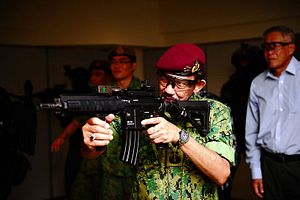This week, Singapore’s new air force chief paid his first visit to Brunei his current capacity. The visit placed the focus on the defense side of the relationship between the two Southeast Asian states amid wider domestic and regional change.
As I have noted previously in these pages, Singapore and Brunei have a close defense relationship as part of their broader bilateral relationship. This is reflected not just in traditional aspects like exchanges, visits, and exercises, but also the fact that Brunei has benefited from the expertise of the Singapore Armed Forces. Singapore’s military also holds training in Brunei as it does with a number of its other key partners.
The defense relationship has continued over the past year as well, through both exercises and regular meetings. One aspect of this has been high-level visits, with particular attention on them as officials from both sides pay introductory visits after assuming their positions following some personnel changes in 2018 and 2019, which in some cases are tied to wider domestic developments in these countries.
Last week, the defense aspect of the relationship was in the headlines again with the introductory visit of Singapore’s new air force chief to Brunei. Kelvin Khong, the chief of the Republic of Singapore Air Force (RSAF), was in Brunei for the first trip to the Southeast Asian state in his current capacity, which he had assumed in March 2019 from his predecessor Mervyn Tan.
Khong’s trip, which lasted from May 2 to May 3, included a series of interactions. These included meetings with officials in Brunei, including Brunei’s second minister of defense Haji Awang Halbi (the defense minister’s portfolio in Brunei is still held by the head of state Sultan Hassanal Bolkiah).
Per Brunei’s defense ministry (MINDEF), during the meeting, Khong and Halbi reviewed the existing state of the relationship between their two countries, including between their two air forces, which includes visits, dialogues, meetings, exercises, trainings, courses, exhibitions, and various forms of development programs. They also discussed other issues of mutual interest and potential opportunities for defense ties in the future as well, building on the extensive cooperation between the two defense establishments over the decades.
Unsurprisingly, few additional specifics were publicly disclosed about the private deliberations between the two sides. Nonetheless, amid wider domestic and foreign policy changes that both countries experience, the developments on the bilateral defense relationship will continue to be interesting to watch in 2019 and beyond.






























